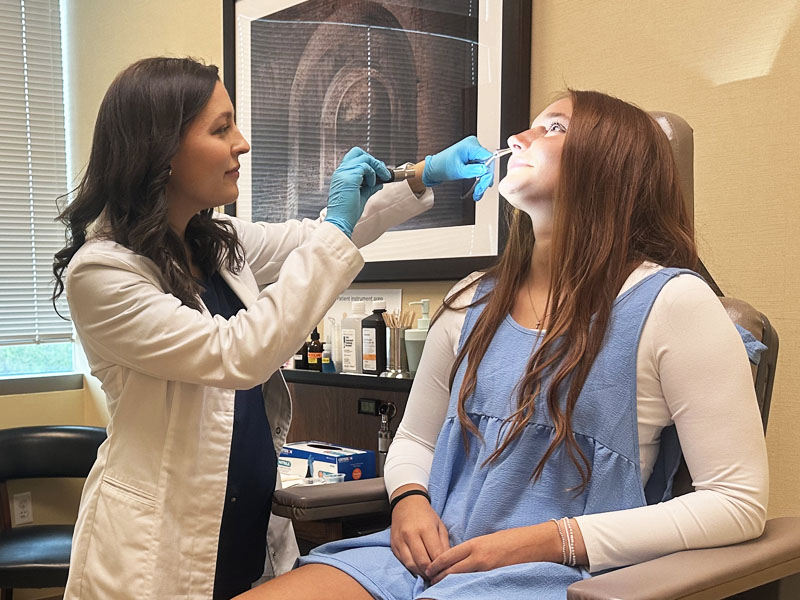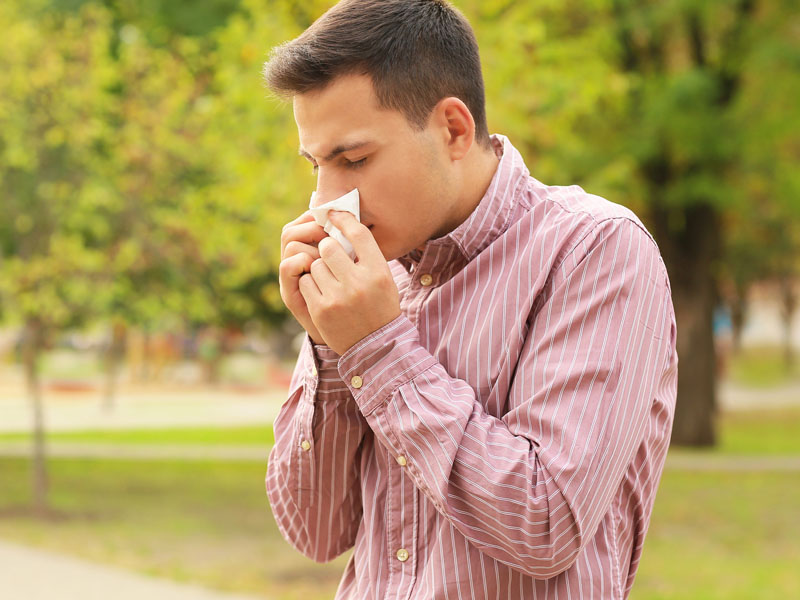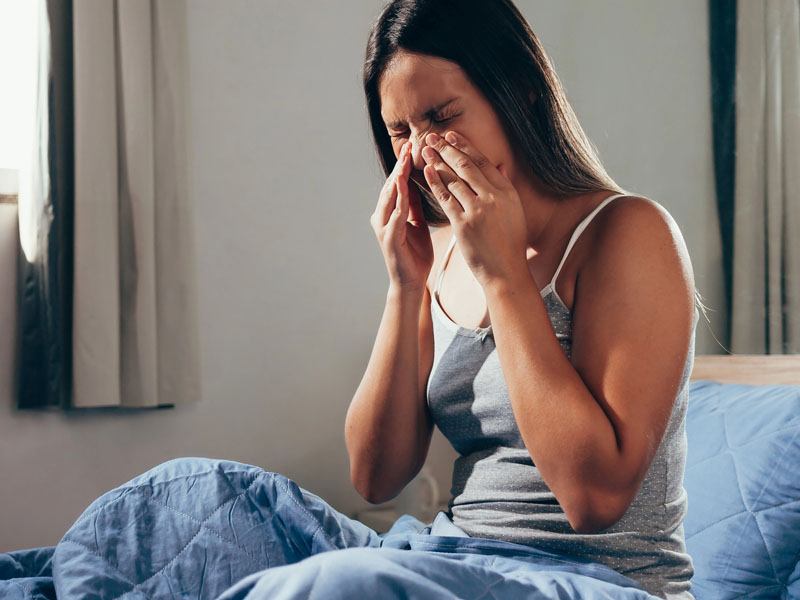Sinus and Nose Doctor in Jacksonville
Treatments and Procedures That Allow You to Feel and Breathe Better.
If you’re searching for a sinus and nose doctor in Jacksonville due to ongoing nasal congestion, sinus pressure, or a chronic condition that hasn’t improved with over-the-counter medications, you’re in the right place.
Dr. Robert Todd Snowden is recognized as one of the leading Ear, Nose, and Throat, (ENT) specialists in Northeast Florida. With decades of experience and a reputation for compassionate, patient-focused care, Dr. Snowden combines advanced diagnostic tools and the latest medical technology to deliver customized treatment plans designed to address each patient’s unique sinus and nasal health concerns.
At Snowden ENT, we understand that sinus and nose issues can significantly impact your quality of life. That’s why we’ve made it easy for you to explore the wide range of conditions Dr. Snowden treats. Whether you’re dealing with chronic sinusitis, nasal polyps, deviated septum, or allergic rhinitis, our website offers a comprehensive list of conditions along with links to effective treatment options and procedures.
To begin your journey toward lasting relief, simply browse the list of sinus and nasal conditions we treat below and click the links to learn more about the advanced treatments and procedures that can help you get back to breathing better, sleeping better and enjoying life without nose or sinus problems.
Sinus and Nose Doctor in Jacksonville
Treatments and Procedures That Allow You to Feel and Breathe Better.
If you’re searching for a sinus and nose doctor in Jacksonville due to ongoing nasal congestion, sinus pressure, or a chronic condition that hasn’t improved with over-the-counter medications, you’re in the right place.
Dr. Robert Todd Snowden is recognized as one of the leading Ear, Nose, and Throat, (ENT) specialists in Northeast Florida. With decades of experience and a reputation for compassionate, patient-focused care, Dr. Snowden combines advanced diagnostic tools and the latest medical technology to deliver customized treatment plans designed to address each patient’s unique sinus and nasal health concerns.
At Snowden ENT, we understand that sinus and nose issues can significantly impact your quality of life. That’s why we’ve made it easy for you to explore the wide range of conditions Dr. Snowden treats. Whether you’re dealing with chronic sinusitis, nasal polyps, deviated septum, or allergic rhinitis, our website offers a comprehensive list of conditions along with links to effective treatment options and procedures.
To begin your journey toward lasting relief, simply browse the list of sinus and nasal conditions we treat below and click the links to learn more about the advanced treatments and procedures that can help you get back to breathing better, sleeping better and enjoying life without nose or sinus problems.

Nose & Sinus Conditions and Their Respective Treatments and Procedures
Sinus Headaches
Pain or pressure around the cheeks, forehead, or eyes is often described as a “sinus headache.” However, not all headaches in these areas are caused by sinus infections. Migraines, temporomandibular joint (TMJ) problems, and chronic neck pain can mimic sinus symptoms. Some conditions may even cause nasal congestion, ear pressure, or runny nose, making them difficult to tell apart from true sinus infections. Careful evaluation, and sometimes tests such as nasal endoscopy or CT scans, may be needed for an accurate diagnosis.
True sinus infections (sinusitis) often appear with these signs:
- Facial Pain or Pressure – Often around the cheeks, forehead, or eyes.
- Nasal Congestion – Blocked or stuffy nose.
- Thick Nasal Discharge – Yellow or green mucus.
- Fever or Tooth Discomfort – May occur in some cases.
If these symptoms last longer than a few weeks without improvement or worsen after seeming to improve, it may be a bacterial infection.
When to See an ENT Doctor
If your sinus headaches keep coming back or don’t improve with sinus infection treatment, an evaluation by a trained ENT specialist can help your headaches and avoid unnecessary antibiotics or surgery. Accurate diagnosis leads to better treatment options, such as migraine-specific medications or referral to the appropriate specialist.
Nose & Sinus Conditions and Their Respective Treatments and Procedures
Sinus Headaches
Pain or pressure around the cheeks, forehead, or eyes is often described as a “sinus headache.” However, not all headaches in these areas are caused by sinus infections. Migraines, temporomandibular joint (TMJ) problems, and chronic neck pain can mimic sinus symptoms. Some conditions may even cause nasal congestion, ear pressure, or runny nose, making them difficult to tell apart from true sinus infections. Careful evaluation, and sometimes tests such as nasal endoscopy or CT scans, may be needed for an accurate diagnosis.
True sinus infections (sinusitis) often appear with these signs:
- Facial Pain or Pressure – Often around the cheeks, forehead, or eyes.
- Nasal Congestion – Blocked or stuffy nose.
- Thick Nasal Discharge – Yellow or green mucus.
- Fever or Tooth Discomfort – May occur in some cases.
If these symptoms last longer than a few weeks without improvement or worsen after seeming to improve, it may be a bacterial infection.
When to See an ENT Doctor
If your sinus headaches keep coming back or don’t improve with sinus infection treatment, an evaluation by a trained ENT specialist can help your headaches and avoid unnecessary antibiotics or surgery. Accurate diagnosis leads to better treatment options, such as migraine-specific medications or referral to the appropriate specialist.
Recurring Sinus Infections
Recurring sinus infections, also called chronic or recurrent sinusitis, can develop for several reasons. Common causes include:
- Underlying Allergies – Ongoing inflammation can block the sinuses and create an environment where bacteria thrive.
- Structural Problems – A deviated septum, nasal polyps, or enlarged turbinates can block normal sinus drainage and increase the risk of infection.
- Previous Infections – A “biofilm”, or thin layer of residual bacteria and other microbes, may persist in the sinus cavity and trigger repeat flare-ups.
- Poor Sinus Drainage – Swelling, inflammation, or anatomical blockage can impair drainage, leading to recurring problems.
- Environmental Triggers & Irritants – Exposure to smoke, air pollution, dry air, or chemical irritants can inflame the sinus lining.
- Dental Problems – Infections in the upper teeth, especially the molars, can spread into the adjacent maxillary sinuses.
- Overuse of Nasal Decongestant Sprays – Using sprays such as oxymetazoline (Afrin) for more than three consecutive days can cause rebound congestion and worsen sinus issues.
- Immune system problems – Some people have conditions that make it harder to fight off infections, such as immunodeficiency or diabetes.
- Autoimmune diseases– Rarely, autoimmune conditions such as granulomatosis with polyangiitis can cause inflammation in the sinuses
Potential Treatments and Procedures
- Prescription medications, such as nasal steroids and antihistamines
- Saline sinus rinses, sometimes with medication added
- Allergy management
- Treatment of underlying medical problems
- Endoscopic Sinus Surgery
- Balloon Sinuplasty
Recurring Sinus Infections
Recurring sinus infections, also called chronic or recurrent sinusitis, can develop for several reasons. Common causes include:
- Underlying Allergies – Ongoing inflammation can block the sinuses and create an environment where bacteria thrive.
- Structural Problems – A deviated septum, nasal polyps, or enlarged turbinates can block normal sinus drainage and increase the risk of infection.
- Previous Infections – A “biofilm”, or thin layer of residual bacteria and other microbes, may persist in the sinus cavity and trigger repeat flare-ups.
- Poor Sinus Drainage – Swelling, inflammation, or anatomical blockage can impair drainage, leading to recurring problems.
- Environmental Triggers & Irritants – Exposure to smoke, air pollution, dry air, or chemical irritants can inflame the sinus lining.
- Dental Problems – Infections in the upper teeth, especially the molars, can spread into the adjacent maxillary sinuses.
- Overuse of Nasal Decongestant Sprays – Using sprays such as oxymetazoline (Afrin) for more than three consecutive days can cause rebound congestion and worsen sinus issues.
- Immune system problems – Some people have conditions that make it harder to fight off infections, such as immunodeficiency or diabetes.
- Autoimmune diseases– Rarely, autoimmune conditions such as granulomatosis with polyangiitis can cause inflammation in the sinuses
Potential Treatments and Procedures
- Prescription medications, such as nasal steroids and antihistamines
- Saline sinus rinses, sometimes with medication added
- Allergy management
- Treatment of underlying medical problems
- Endoscopic Sinus Surgery
- Balloon Sinuplasty
Persistent Runny Nose, Congestion and Sneezing
Chronic Rhinitis & Allergic Rhinitis
Chronic Rhinitis is a long-lasting condition that causes symptoms like a runny or stuffy nose, sneezing, itching, and postnasal drip. These symptoms can make it hard to sleep and affect daily activities. Chronic rhinitis is not just one disease—it includes several types, with allergic rhinitis and vasomotor rhinitis being the most common.
Allergic rhinitis happens when the immune system overreacts to things in the air, such as pollen, dust mites, or pet dander. This reaction causes the body to release chemicals like histamine, leading to swelling and irritation in the nose, sinuses, throat, and eyes. People with allergic rhinitis often have sneezing, itchy eyes or nose, and clear, watery nasal discharge. Allergic rhinitis can be seasonal (triggered by pollen) or year-round (triggered by indoor allergens).
Vasomotor rhinitis (also called nonallergic rhinitis) is not caused by allergies or infections. Instead, it is triggered by things like strong smells, changes in weather, smoke, or even stress. Symptoms are similar—nasal congestion and runny nose—but usually without itching or sneezing. Vasomotor rhinitis is thought to be caused by overactive nerves in the nose that respond to irritants or temperature changes, and it often becomes more noticeable with age. Both types can lead to problems like sinus infections, headaches, and trouble sleeping.
Potential Treatments and Procedures
Lifestyle & Allergen Avoidance for Allergic Rhinitis:
- Use HEPA air filters in your home.
- Keep windows closed during pollen season.
- Wash bedding in hot water weekly.
- Use dust mite proof sheets and pillow cases.
- Bathe pets or have them bathed regularly.
- Reduce interior humidity to prevent mold.
Medications (Discuss with your physician first):
- Oral antihistamines such as Claritin, Zyrtec or Allegra; or topical antihistamines such as azelastine.
- Anticholinergic sprays such as ipratropium.
- Nasal Corticosteroids such as Flonase, Budesonide or Nasonex.
- Decongestants such as Sudafed.
- Leukotriene Receptor Antagonists such as Singulair.
- Saline Nasal Irrigation such as a Neti pot or saline spray.
- Compounded medications in saline rinses.
Medical Procedures:
- Endoscopic Sinus Surgery: Surgically remove polyps, blockages, or inflammation of the sinuses.
- Posterior Nasal Nerve (PNN) Ablation: A minimally invasive procedure that targets nerves responsible for chronic runny nose or congestion.
- Turbinate Reduction Surgery: Shrinks swollen nasal structures, (turbinates) to improve airflow.
- Balloon Sinuplasty: Opens blocked sinuses using a tiny balloon for better drainage and symptom relief.
Persistent Runny Nose, Congestion and Sneezing
Chronic Rhinitis & Allergic Rhinitis
Chronic Rhinitis is a long-lasting condition that causes symptoms like a runny or stuffy nose, sneezing, itching, and postnasal drip. These symptoms can make it hard to sleep and affect daily activities. Chronic rhinitis is not just one disease—it includes several types, with allergic rhinitis and vasomotor rhinitis being the most common.
Allergic rhinitis happens when the immune system overreacts to things in the air, such as pollen, dust mites, or pet dander. This reaction causes the body to release chemicals like histamine, leading to swelling and irritation in the nose, sinuses, throat, and eyes. People with allergic rhinitis often have sneezing, itchy eyes or nose, and clear, watery nasal discharge. Allergic rhinitis can be seasonal (triggered by pollen) or year-round (triggered by indoor allergens).
Vasomotor rhinitis (also called nonallergic rhinitis) is not caused by allergies or infections. Instead, it is triggered by things like strong smells, changes in weather, smoke, or even stress. Symptoms are similar—nasal congestion and runny nose—but usually without itching or sneezing. Vasomotor rhinitis is thought to be caused by overactive nerves in the nose that respond to irritants or temperature changes, and it often becomes more noticeable with age. Both types can lead to problems like sinus infections, headaches, and trouble sleeping.
Potential Treatments and Procedures
Lifestyle & Allergen Avoidance for Allergic Rhinitis:
- Use HEPA air filters in your home.
- Keep windows closed during pollen season.
- Wash bedding in hot water weekly.
- Use dust mite proof sheets and pillow cases.
- Bathe pets or have them bathed regularly.
- Reduce interior humidity to prevent mold.
Medications (Discuss with your physician first):
- Oral antihistamines such as Claritin, Zyrtec or Allegra; or topical antihistamines such as azelastine.
- Anticholinergic sprays such as ipratropium.
- Nasal Corticosteroids such as Flonase, Budesonide or Nasonex.
- Decongestants such as Sudafed.
- Leukotriene Receptor Antagonists such as Singulair.
- Saline Nasal Irrigation such as a Neti pot or saline spray.
- Compounded medications in saline rinses.
Medical Procedures:
- Endoscopic Sinus Surgery: Surgically remove polyps, blockages, or inflammation of the sinuses.
- Posterior Nasal Nerve (PNN) Ablation: A minimally invasive procedure that targets nerves responsible for chronic runny nose or congestion.
- Balloon Sinuplasty: Opens blocked sinuses using a tiny balloon for better drainage and symptom relief.

Nasal Blockage: When You Just Can’t Breathe Well Through Your Nose
If you’re struggling to breathe clearly through your nose due to partial blockages or chronic sinus issues, you’re not alone, and you don’t have to live with it. Nasal obstruction can significantly impact your daily life, disrupt restful sleep, and reduce your overall quality of life. Fortunately, Dr. Robert Todd Snowden, a respected sinus and nose doctor in Jacksonville, offers expert diagnosis and advanced treatment options to help you breathe freely again.
Dr. Snowden specializes in identifying the underlying causes of nasal and sinus blockages. Using state-of-the-art diagnostic tools, Dr. Snowden will thoroughly evaluate your nasal passages and sinus structures to determine the precise source of your breathing difficulties.
Once your condition is accurately diagnosed, Dr. Snowden will walk you through your personalized treatment plan, including both non-surgical and surgical options tailored to deliver long-lasting relief. If you’re searching for a highly skilled and compassionate sinus and nose doctor in Jacksonville, Dr. Snowden and his team at Snowden ENT are here to help you breathe easier and feel better.
Some of the most common nasal and sinus blockages and treatments include:
Deviated Nasal Septum
Cause:
A deviated septum occurs when the wall that divides the two sides of your nose (the septum) is shifted off center. This can be something you’re born with, develop as you get older, or result from an injury.
Symptoms:
When the septum is crooked, it can make one or both sides of the nose feel blocked. People with a deviated septum often notice nasal congestion, a blocked nose, reduced sense of smell, or trouble sleeping and enjoying daily activities.
Available Treatments:
For mild cases, treatments such as saline rinses or steroid nasal sprays may help reduce swelling inside the nose, though they cannot straighten the septum itself. These options may provide some short-term relief, but usually don’t solve the problem if the septum is significantly bent.
When symptoms are more severe or persistent, the most effective treatment is septoplasty surgery. This outpatient procedure straightens the septum and may be combined with a turbinate reduction to further improve airflow. Septoplasty has been shown to provide lasting relief of nasal blockage, better breathing, improved sense of smell, and better quality of life, with a low risk of complications.
Nasal Polyps
Nasal polyps are soft, noncancerous growths in the nose or sinuses, often linked to long-term inflammation from allergies, asthma, or immune conditions.
Symptoms:
- Blocked or stuffy nose
- Reduced or lost sense of smell
- Runny nose or postnasal drip
- Sinus pain or pressure
Available Treatments:
-
Nasal steroid sprays (fluticasone, mometasone) – first-line treatment; safe long-term
-
Saline rinses – can help to thin out or reduce mucus drainage
-
Steroid + saline rinses – often used in combination for stronger effect
-
Short-term oral or injectable steroids – for severe flare-ups
-
Endoscopic sinus surgery – removes polyps very effectively, but they may return without ongoing medical therapy
- Biologic medicines (dupilumab, mepolizumab, omalizumab) – newest options for severe, recurring polyps
Polyps are not cancerous but often come back, so ongoing care is important. Managing related issues like asthma, allergies, or aspirin sensitivity can also improve outcomes.
Enlarged Turbinates (Hypertrophic Turbinates)
The turbinates, (structures inside the nose that filter and humidify air) can swell due to allergies, infection, or chronic inflammation.
Symptoms:
- Stuffy or blocked nose
- Snoring
Available Treatments:
- Nasal steroids – reduce swelling and improve breathing
- Short-term oral or injectable steroids – for severe flare-ups
- Turbinate reduction surgery – considered when medications don’t provide lasting relief
Nasal Blockage: When You Just Can’t Breathe Well Through Your Nose
If you’re struggling to breathe clearly through your nose due to partial blockages or chronic sinus issues, you’re not alone, and you don’t have to live with it. Nasal obstruction can significantly impact your daily life, disrupt restful sleep, and reduce your overall quality of life. Fortunately, Dr. Robert Todd Snowden, a respected sinus and nose doctor in Jacksonville, offers expert diagnosis and advanced treatment options to help you breathe freely again.
Dr. Snowden specializes in identifying the underlying causes of nasal and sinus blockages. Using state-of-the-art diagnostic tools, Dr. Snowden will thoroughly evaluate your nasal passages and sinus structures to determine the precise source of your breathing difficulties.
Once your condition is accurately diagnosed, Dr. Snowden will walk you through your personalized treatment plan, including both non-surgical and surgical options tailored to deliver long-lasting relief. If you’re searching for a highly skilled and compassionate sinus and nose doctor in Jacksonville, Dr. Snowden and his team at Snowden ENT are here to help you breathe easier and feel better.
Some of the most common nasal and sinus blockages and treatments include:
Deviated Nasal Septum
Cause: The wall dividing the nasal passages is off-center, blocking one or both nostrils.
Symptoms:
- Blocked nose
- Decreased or lost sense of smell
Available Treatments:
- Mild: Nasal steroid sprays or decongestants
- Severe: Septoplasty surgery to straighten the septum
Nasal Polyps
Nasal polyps are soft, noncancerous growths in the nose or sinuses, often linked to long-term inflammation from allergies, asthma, or immune conditions.
Symptoms:
- Blocked or stuffy nose
- Reduced or lost sense of smell
- Runny nose or postnasal drip
- Sinus pain or pressure
Available Treatments:
-
Nasal steroid sprays (fluticasone, mometasone) – first-line treatment; safe long-term
-
Saline rinses – can help to thin out or reduce mucus drainage
-
Steroid + saline rinses – often used in combination for stronger effect
-
Short-term oral or injectable steroids – for severe flare-ups
-
Endoscopic sinus surgery – removes polyps very effectively, but they may return without ongoing medical therapy
- Biologic medicines (dupilumab, mepolizumab, omalizumab) – newest options for severe, recurring polyps
Polyps are not cancerous but often come back, so ongoing care is important. Managing related issues like asthma, allergies, or aspirin sensitivity can also improve outcomes.
Enlarged Turbinates (Hypertrophic Turbinates)
The turbinates, (structures inside the nose that filter and humidify air) can swell due to allergies, infection, or chronic inflammation.
Symptoms:
- Stuffy or blocked nose
- Snoring
Available Treatments:
- Nasal steroids – reduce swelling and improve breathing
- Short-term oral or injectable steroids – for severe flare-ups
- Turbinate reduction surgery – considered when medications don’t provide lasting relief
Sleep Disturbance & Snoring
Cause – Snoring happens when air can’t move smoothly through the nose and throat during sleep. This makes the tissues vibrate and create noise.
A blocked nose makes snoring more likely. Common causes in the nose include:
- Allergies and chronic congestion
- A deviated septum (crooked wall inside the nose)
- Swollen nasal tissues (turbinates)
- Other nasal or sinus conditions
Sometimes snoring is only a nuisance, but it can also be a sign of sleep apnea—a serious condition where breathing repeatedly stops and starts during sleep. If snoring is loud, frequent, or linked to choking, gasping, or daytime sleepiness, don’t ignore it. These can be signs of sleep apnea, which has serious health risks if left untreated.
Symptoms – Watch for these warning signs:
- Loud or frequent snoring
- Gasping, choking, or waking up often at night
- Needing to breathe through your mouth while sleeping
- Feeling tired or unrefreshed during the day
- Morning headache
Available Treatments – Treatment depends on the cause and severity. Options include:
- Lifestyle changes: lose weight, avoid alcohol before bed, sleep on your side
- Nasal treatments: saline rinses or nasal steroid sprays to reduce swelling and improve airflow
- Nasal dilator strips: may help with mild snoring but do not treat sleep apnea
- Oral devices: reposition the jaw to keep the airway open (for snoring or mild sleep apnea)
- Nasal Surgery: correcting a deviated septum or reducing swollen turbinate tissues may improve breathing
- CPAP therapy: the most effective treatment if there is sleep apnea. Improving nasal breathing can make CPAP easier to use
Snoring can be difficult to treat, and it’s often caused by more than one factor–some easier to correct than others. The first step is to identify what’s contributing and address each issue individually. If your snoring is linked to nasal blockage or other symptoms, an ENT specialist can evaluate your airway, determine the cause, and recommend the right treatment so you can breathe—and sleep—better.
Sleep Disturbance | Snoring
Cause – Snoring happens when air can’t move smoothly through the nose and throat during sleep. This makes the tissues vibrate and create noise.
A blocked nose makes snoring more likely. Common causes in the nose include:
- Allergies and chronic congestion
- A deviated septum (crooked wall inside the nose)
- Swollen nasal tissues (turbinates)
- Other nasal or sinus conditions
Sometimes snoring is only a nuisance, but it can also be a sign of sleep apnea—a serious condition where breathing repeatedly stops and starts during sleep. If snoring is loud, frequent, or linked to choking, gasping, or daytime sleepiness, don’t ignore it. These can be signs of sleep apnea, which has serious health risks if left untreated.
Symptoms – Watch for these warning signs:
- Loud or frequent snoring
- Gasping, choking, or waking up often at night
- Needing to breathe through your mouth while sleeping
- Feeling tired or unrefreshed during the day
- Morning headache
Available Treatments – Treatment for snoring depends on the cause and severity. Options include:
- Lifestyle changes: lose weight, avoid alcohol before bed, sleep on your side
- Nasal treatments: saline rinses or nasal steroid sprays to reduce swelling and improve airflow
- Nasal dilator strips: may help with mild snoring but do not treat sleep apnea
- Oral devices: reposition the jaw to keep the airway open (for snoring or mild sleep apnea)
- Nasal Surgery: correcting a deviated septum or reducing swollen turbinate tissues may improve breathing
- CPAP therapy: the most effective treatment if there is sleep apnea. Improving nasal breathing can make CPAP easier to use
Snoring can be difficult to treat, and it’s often caused by more than one factor–some easier to correct than others. The first step is to identify what’s contributing and address each issue individually. If your snoring is linked to nasal blockage or other symptoms, an ENT specialist can evaluate your airway, determine the cause, and recommend the right treatment so you can breathe—and sleep—better.
Loss of Smell
A variety of medical problems can make it difficult for a patient to detect odors. Loss of smell can affect taste, safety, and quality of life.
Common Causes
- Sinus or nasal problems such as allergies, chronic sinus inflammation, or nasal polyps
- Viral infections (colds, flu, COVID-19)
- Head injuries
- Aging
- Certain medications or medical conditions:
Available Treatment
- Nasal sprays
- Short courses of oral steroids
- Olfactory retraining therapy, or “smell training”
- Surgical procedures to treat sinus disease or remove polyps
If you’ve lost your sense of smell, and especially if you have a history of nasal congestion, allergies, sinus infections, or nasal polyps, it’s time to consult an experienced sinus surgeon in Jacksonville.
Loss of Smell
A variety of medical problems can make it difficult for a patient to detect odors. Loss of smell can affect taste, safety, and quality of life.
Common Causes
- Sinus or nasal problems such as allergies, chronic sinus inflammation, or nasal polyps
- Viral infections (colds, flu, COVID-19)
- Head injuries
- Aging
- Certain medications or medical conditions:
Available Treatment
- Nasal sprays
- Short courses of oral steroids
- Olfactory retraining therapy, or “smell training”
- Surgical procedures to treat sinus disease or remove polyps
If you’ve lost your sense of smell, and especially if you have a history of nasal congestion, allergies, sinus infections, or nasal polyps, it’s time to consult an experienced sinus surgeon in Jacksonville.
What Our Patients Are Saying
Contact Us!
(904) 268-5366
Or, if it is more convenient, use our contact form and we’ll get back to you as soon as possible.
Contact Us!
(904) 268-5366
Or, if it is more convenient, use our contact form and we’ll get back to you as soon as possible.
Snowden ENT is proud to be a select ENT Provider of the Baptist Physician Partners network. The mission of Baptist Physician Partners is to shape the future of health care in our community through an integrated partnership of providers and Baptist Health hospitals working collaboratively toward common goals for improving quality, safety, efficiency and outcomes for our patients.

12574 Flagler Center Boulevard, Suite 201
Jacksonville, FL 32258
(904) 268-5366
Monday – Thursday 8:30 AM to 4:30 PM
Friday 8:30 AM to 3:45 PM

Snowden ENT is proud to be a select ENT Provider of the Baptist Physician Partners network. The mission of Baptist Physician Partners is to shape the future of health care in our community through an integrated partnership of providers and Baptist Health hospitals working collaboratively toward common goals for improving quality, safety, efficiency and outcomes for our patients.
12574 Flagler Center Blvd.
Jacksonville, FL 32258
(904) 268-5366
Monday – Thursday 8:30 AM to 4:30 PM
Friday 8:30 AM to 3:45 PM
Copyright | Snowden ENT | All Rights Reserved | Created and Optimized by BoomClient




